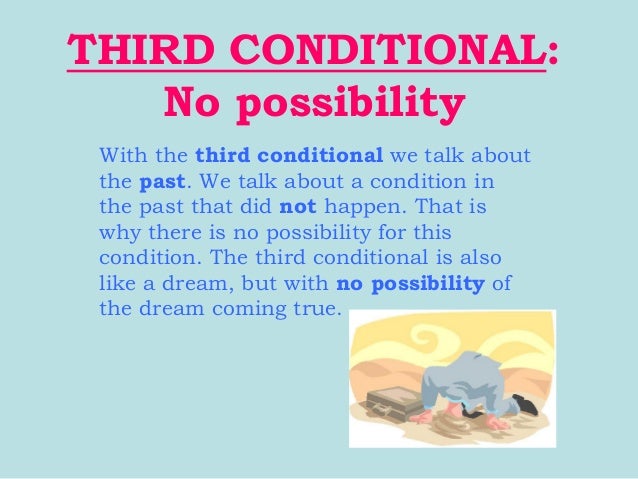UNIVERSIDAD NACIONAL DE CHIMBORAZO
Facultad de Ciencias de la Educación, Humanas y Tecnologías
Carrera de Ingles
THIRD CONDITIONAL

The third conditional
is called the past unreal conditional. It is for past actions.
THIRD CONDITIONAL STRUCTURE
If + Subject + Had + Past Participle, + Subject + Modal + Have + Past Participle
Examples:
Could
If I had known about the party, I could have gone.
Should
If you had known about the party, you should have told me.
Might
If he had known about the party, he might have gone.
Would
If I had known about the party, I would have gone.
USES
Imaginary situations in the past
This includes actions that did not happen in the past.
Examples:
If + Subject + Had + Past Participle, + Subject + Modal + Have + Past Participle
Examples:
Could
If I had known about the party, I could have gone.
Should
If you had known about the party, you should have told me.
Might
If he had known about the party, he might have gone.
Would
If I had known about the party, I would have gone.
USES
Imaginary situations in the past
This includes actions that did not happen in the past.
Examples:
- If I had gone to university, I would have studied medicine.
- If You had gone to the party, you would have met him.
Advice in the past
These sentences usually don't have an "if" clause, and can
often be more direct.
Examples:
These sentences usually don't have an "if" clause, and can
often be more direct.
Examples:
- You should have saved your money.
- You should not have gone with him.
Describes what you
would have done differently
Example:
Example:
- If I had been you, I would not have bought those shoes.
- If I had thought about it, I wouldn't have eaten so much.
Questions
Here are some examples of questions with the 3rd conditional:
Here are some examples of questions with the 3rd conditional:
- What would you have done if you had been me?
- Would you have finished if you had had more time?
- Would you have bought something cheaper?
- Should we have paid more attention in class?

The third conditional is
called the past unreal
conditional. It is for past
actions.
To learn more about the
third conditional, try the
lesson and tests below.
called the past unreal
conditional. It is for past
actions.
To learn more about the
third conditional, try the
lesson and tests below.
THIRD CONDITIONAL STRUCTUREIf + Subject + Had + Past Participle,
+ Subject + Modal + Have + Past Participle
Examples: CouldIf I had known about the party, I could have gone.ShouldIf you had known about the party, you should have told me.MightIf he had known about the party, he might have gone.WouldIf I had known about the party, I would have gone.USESImaginary situations in the pastThis includes actions that did not happen in the past.
Examples:
Advice in the pastThese sentences usually don't have an "if" clause, and can
often be more direct.
Examples:
Describes what you would have done differentlyExample:
QuestionsHere are some examples of questions with the 3rd conditional:
+ Subject + Modal + Have + Past Participle
Examples: CouldIf I had known about the party, I could have gone.ShouldIf you had known about the party, you should have told me.MightIf he had known about the party, he might have gone.WouldIf I had known about the party, I would have gone.USESImaginary situations in the pastThis includes actions that did not happen in the past.
Examples:
- If I had gone to university, I would have studied medicine.
- If You had gone to the party, you would have met him.
Advice in the pastThese sentences usually don't have an "if" clause, and can
often be more direct.
Examples:
- You should have saved your money.
- You should not have gone with him.
Describes what you would have done differentlyExample:
- If I had been you, I would not have bought those shoes.
- If I had thought about it, I wouldn't have eaten so much.
QuestionsHere are some examples of questions with the 3rd conditional:
- What would you have done if you had been me?
- Would you have finished if you had had more time?
- Would you have bought something cheaper?
- Should we have paid more attention in class?
.jpg)
No hay comentarios:
Publicar un comentario